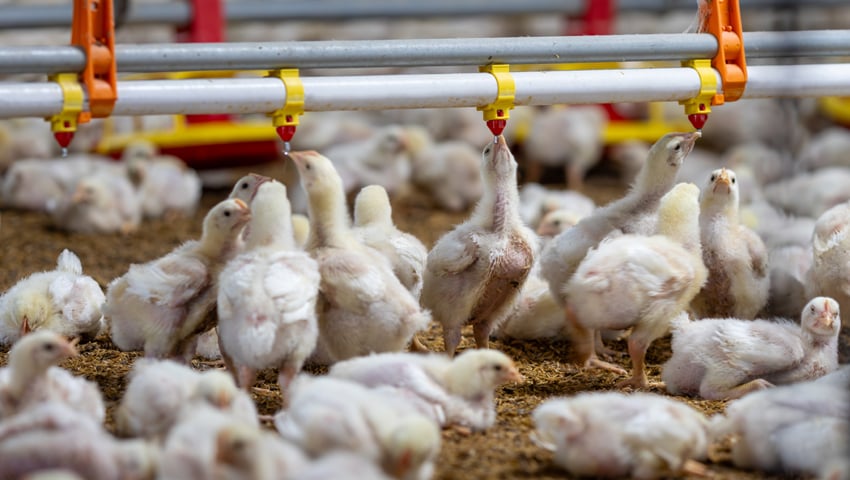Aldi has announced new stocking density requirements for its fresh chicken suppliers in a bid to improve animal welfare standards.
The transition to the higher welfare standard (fresh chicken, not processed), which will be completed by October 2024, means that chickens will be stocked at 30kg/m2 and have 20% more space than the industry standard.
This will allow the birds more space to engage in natural behaviours such as stretching wings, dust bathing and roaming, with greater access to environmental enrichment such as straw bales, perches, pecking objects and natural light.
Aldi managing director of buying Julie Ashfield said, “Animal welfare is of paramount importance to us. We’re already one of the UK’s largest providers of responsibly farmed chicken and we’ve been working hard with our suppliers to reduce stocking density to help us improve the living conditions of these animals even further.”
Other retailers have already announced similar commitments for fresh chicken products, with Morrisons promising stocking densities of 30kg/m2 by November 2024 and Lidl promising the change by January 2025. Sainsbury’s has already delivered lower stocking densities and Tesco says it will do so by the first half of 2025.
Better Chicken Commitment
Waitrose and M&S however have gone further than other major retailers with promises to deliver the full criteria outlined in the Better Chicken Commitment (BCC) for all chicken products (fresh and processed).
The BCC was developed in 2017 by European NGOs (including Compassion in World Farming) and called on companies to make significant welfare improvements in the rearing and slaughter of broiler chickens by 2026.
The BCC is based on science-led criteria to ensure a better quality of life for broiler chickens:
- Slower growing breeds: using breeds that demonstrate higher welfare outcomes
- More space to live: a stocking density of 30kg/m2 or less
- Environmental enrichment: providing a least two metres of usable perch space and two pecking substates per 1,000 birds
- Natural light: at least 50 lux of light, including natural light
- More humane slaughter: adopting Controlled Atmospheric Stunning using inert gas or multi-phase systems, or effective electrical stunning without live inversion
- Third-party auditing: meaningful third-party animal welfare audits and annual reporting
- M&S have already made the full transition for their fresh chicken products, while Waitrose has delivered against all criteria except breed change, which is expected to follow by 2026.
Progress welcomed
Jo Cooper, from Compassion in World Farming’s Food Business Team, welcomed the progress outlined in Aldi’s announcement.
She said, “Many UK retailers are moving to 30kg/m2 stocking density and have made announcements recently. Obviously, this is a positive move as it gives the birds more space in the shed, which we welcome – and it is one of the key criteria of the Better Chicken Commitment (BCC).
“However, what we are asking for is for all retailers to sign-up to the full criteria of the BCC, which includes a vital move to a slower growing breed. Research shows that fast-growing breeds often suffer health issues, pain and lameness due to their rapid growth so without breed change and the full package of BCC criteria being introduced, we don’t consider chicken as higher welfare.
“To date, only M&S and Waitrose have signed up to BCC but if another major UK retailer started to move on breed this could create a similar ripple across the market as we have seen for stocking density.
“We believe the BCC offers a comprehensive set of science-based criteria that, only when fully implemented as a package, will significantly enhance the welfare of broiler chickens. Without changing to slower growing breeds, a farming system simply cannot be considered higher welfare.”
